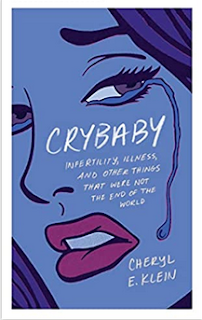Cheryl E. Klein is the author of the new memoir Crybaby: Infertility, Illness, and Other Things That Were Not the End of the World. Her other books include The Commuters, and her work has appeared in a variety of publications, including MUTHA Magazine. She lives in Los Angeles.
Q: What inspired you to write Crybaby?
A: I started it the day after I was diagnosed with breast cancer. I'd already had a hard year, following fertility treatment and a miscarriage that led to a mental health crisis. I had a semi-conscious thought that "one bad event is unfortunate, and two bad events is a memoir."
It's not quite that simple, of course, but ultimately writing was a major coping mechanism while I was going through treatment. Writing for an imagined (and now real!) audience forced me to have some perspective and humor about my experience, as opposed to just being mopey and terrified.
Q: How was the book's title chosen, and what does it signify for you?
A: I'm a crier, and I wanted a baby, and I cried a lot because I wanted a baby. On a slightly deeper level, this is a book about the fact that there's no such thing as a wrong emotion. I was raised to believe that emotions were fine as long as you could rationalize them.
But emotions have their own strange logic, and accepting that is a lifelong process for me. So there are a lot of scenes in the book where, for example, I'm mad at my friends who get pregnant easily. That's not really fair to them, but I had to let that fire burn through me.
Q: The author Shira Spector said of the book, “In this fiercely honest, sharply observed memoir diving into the tumult of relationships, living with cancer, infertility, longing, loss, and complicated hope, Cheryl E. Klein surfaces with insights bright and beautiful as sea glass.” What do you think of that description?
A: It's a huge honor; Shira's own book about infertility and cancer (Red Rock Baby Candy) is a gorgeous visual and textual poem. I like the idea of sea glass because it's a broken thing that becomes beautiful and new as it's tossed about in the ocean.
Q: What impact did writing the book have on you?
A: I wrote it over the course of about seven or eight years, so it had different impacts at different times. First, it was the thing that got me through treatment; it enabled me to find cancer treatment interesting, and not just a huge bummer.
When we were talking to expectant mothers during our adoption process, we brushed up against so many people's lives. Writing about them allowed me to give weight to touch points that were fleeting but meaningful. I also think that there are so many misconceptions about adoption and what leads a parent to place a child for adoption. So I wanted to provide a window into just a few of the reasons and stories.
Finally, I wanted to create a kind of container for these connected experiences of loss and frustration with the limits of the body, so that I could move on to the next chapter in my life. But I have to say that literature is a lot tidier than life; I'm definitely still haunted by the same old ghosts, in varying degrees.
Q: What are you working on now?
A: I've been writing in MUTHA Magazine about our experiences adopting a second child—my partner jokes that the sequel to Crybaby will be called Crybabies. I've also been working on a murder mystery set in the nonprofit world, which is really fun.
Q: Anything else we should know?
A: I want to give a shout-out to Brown Paper Press, the incredible indie publisher that has been an amazing partner in bringing Crybaby into the world. I'm also grateful to bloggers like you, to independent bookstores, and to everyone else who helps diversify the literary landscape.
--Interview with Deborah Kalb


No comments:
Post a Comment